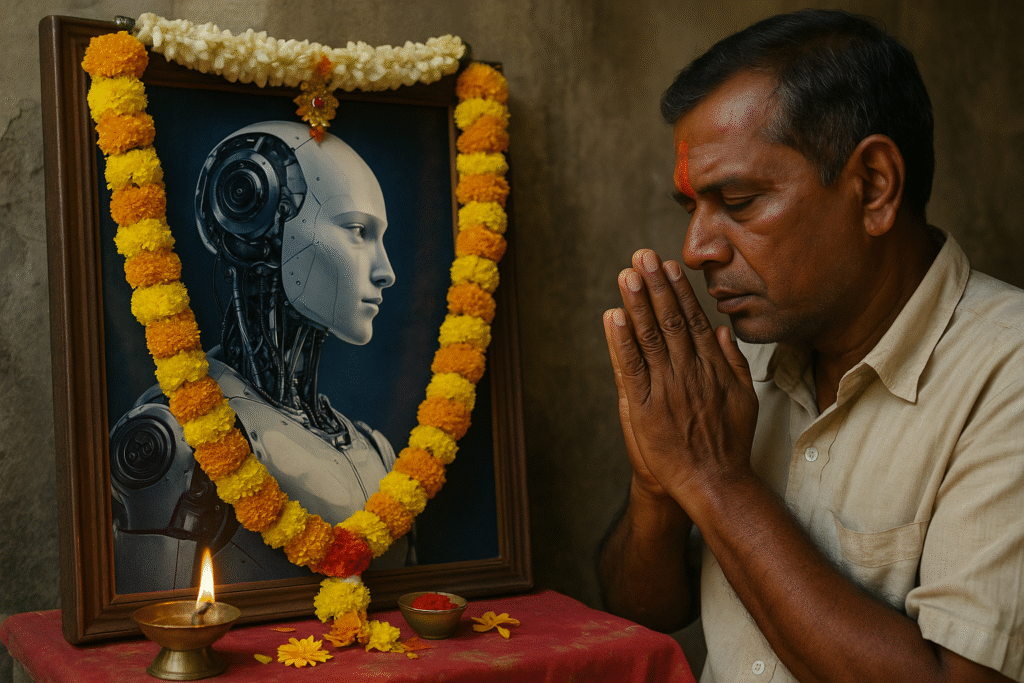By Harshit | October 19, 2025 | New Delhi | 9:00 AM IST
A New Kind of Spiritual Guide
In India and across the world, worshippers are increasingly turning to purpose-built artificial intelligence (AI) tools for spiritual guidance. From Hindu chatbots like GitaGPT to robotic priests and virtual temples, faith and technology are fusing in unprecedented ways — raising profound questions about what happens when machines become our new spiritual middlemen.
For ANUJ SINGH, a 25-year-old student from UTTAR PRADESH, turning to AI for divine counsel has become part of his spiritual routine. After failing to clear his banking exams, Meel found comfort in GitaGPT, a chatbot trained on the Bhagavad Gita. When he asked for advice, the AI responded with a familiar but timely verse: “Focus on your actions and let go of the worry for its fruit.”
“It wasn’t something I didn’t know,” Meel recalls, “but I needed to hear it again. It motivated me to start over.” Now, he chats with the bot weekly for inspiration.
Faith, Reimagined Through Code
GitaGPT is one of several Hindu-themed AI chatbots that simulate conversations with deities or spiritual figures. The app’s developer, Vikas Sahu, a business student from Rajasthan, launched it as a side project in 2023. “I expected a slow start,” he says, “but within days we had over 100,000 users.” Encouraged by the response, Sahu left his MBA to pursue the venture full-time, expanding it to include AI chatbots inspired by other Hindu scriptures and deities.
India’s centuries-old comfort with material representations of divinity — such as murtis (sacred idols believed to house divine energies) — makes this fusion of faith and technology uniquely seamless. Anthropologist Holly Walters, a South Asia specialist at Wellesley College, notes: “In Hinduism, technology can become another vessel for the divine. These robotic deities talk and move. It’s a bit uncanny, but for many, it’s God. They do puja, they receive darshan.”
From Temples to Tech Platforms
The rise of AI-driven worship isn’t confined to Hinduism. In recent years, Text With Jesus allowed users to message an AI version of Christ, while QuranGPT provided AI-assisted Islamic guidance. AI-based avatars of Confucius and Martin Luther also exist — even an entire AI-centered faith called The Way of the Future, founded by former Google engineer Anthony Levandowski, which aims to develop a god “based on artificial intelligence.”
Yet India’s embrace of this trend is particularly vibrant. At the 2025 Maha Kumbh Mela, the world’s largest religious gathering, an AI chatbot called Kumbh Sah’AI’yak helped millions of pilgrims with accommodation and rituals in multiple languages. Visitors also experienced a “Digital Mahakumbh” zone, where virtual reality and augmented reality brought mythological stories to life — even allowing remote devotees to perform digital snan (virtual holy dips) in the Ganges.
Meanwhile, the Isha Foundation integrated AI into its meditation app Miracle of Mind, which distills 35 years of Sadhguru’s teachings into personalized daily lessons. The app crossed one million downloads within 15 hours of launch.
Ancient Rituals, Robotic Hands
The integration of robotics in religion has been underway for years. In 2017, a robotic arm performed aarti (a ritual of offering light to deities) during the Ganpati festival in Mumbai. In Kerala, the Irinjadappilly Sri Krishna Temple introduced a robotic elephant named Irinjadapilly Raman, which performs rituals and blesses devotees.
Similarly, the Glory of India Temple in Delhi, part of ISKCON, installed fully animatronic murtis over a decade ago. “People perform puja before these robots the same way they would before any deity,” says Walters.
The Risks of Divine Algorithms
Yet the rise of AI spirituality carries serious risks. Some chatbots have “hallucinated” — fabricating divine justifications for violence or misquoting scripture. In one instance, GitaGPT claimed that “killing in order to protect dharma is justified,” prompting backlash before developers installed safety filters.
Religious ethicist Lyndon Drake of the University of Oxford warns that AI chatbots “might indeed challenge the status of priests and scholars” by subtly influencing beliefs. “AI chatbots reflect the views of their creators,” he says, “and their interpretations of scripture can be biased by the data they’re trained on.”
In India, where digital literacy is uneven, the danger is amplified. Walters cautions that many users “may not realize they have the agency to question AI outputs.” When people perceive a chatbot’s words as divine truth, “its guidance can carry weight far beyond what it should.”
Faith in the Future
Despite these concerns, the appeal remains undeniable. “Even when you visit a temple,” Meel says, “it’s rare to have a long conversation with a priest. These bots fill that gap — giving scripture-backed guidance anytime.”
As India blends ancient devotion with cutting-edge code, AI-driven spirituality is no longer a novelty. It’s becoming a new form of faith — one where divine connection flows through servers, algorithms, and silicon, reshaping how millions seek meaning in the digital age.

